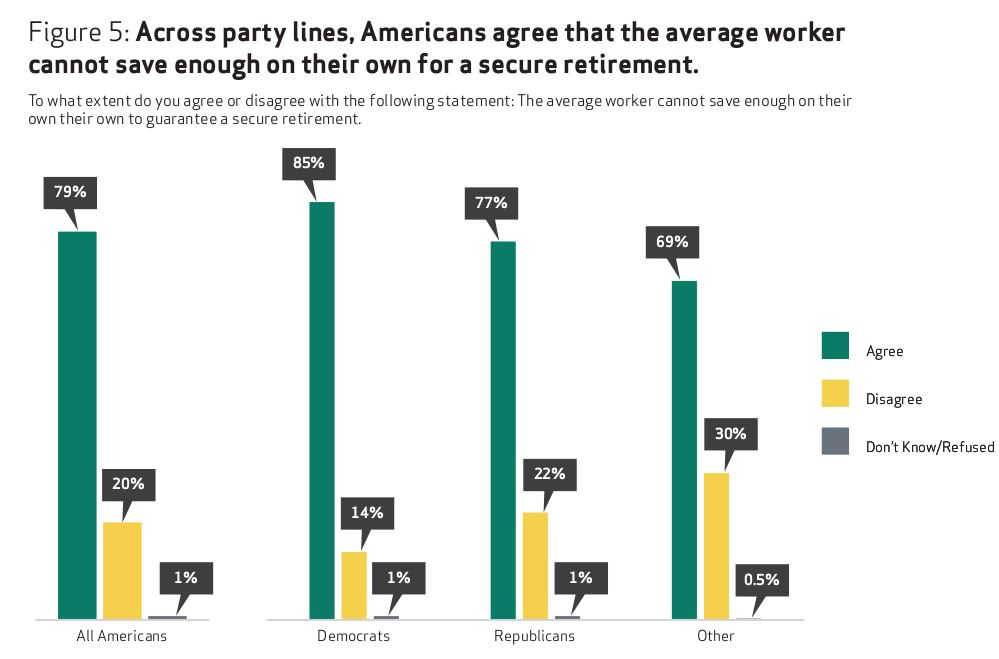Jeff Kempker, CEBS, CRC
I have been aware of the retirement crisis in America for a while now. There are new articles published every week about Americans’ lack of savings, lack of access to retirement plans, and lack of financial knowledge. Combine that with the fact that defined benefit pension plans have all but been extinguished in the private sector, and anyone can see how this is going to turn out. Every once in while there is an article that claims the retirement is crisis is overblown, a farce, a fairy tale, like unicorns and bigfoot. But these articles are few and far between. There is little evidence that suggests we are all going to be OK and there are mountains of facts that say otherwise.
If there was ever, even more, reason to be concerned about the state of retirement security in America, there is a new report from the National Institute on Retirement Security (NIRS), Retirement Security 2017: A Roadmap for Policy Makers, that proves Americans are concerned and aware of the pending retirement bubble. I recently attended NIRS’ Retirement Policy Conference in Washington, D.C. where this study was released along with several presentations by experts all confirming that we are heading for crash if we don’t do something soon. Here are some of the takeaways from the report and the meeting.
“A secure retirement system is the key to economic security.”
Americans Agree There is a Problem
NIRS’ research finds that 76 percent of Americans are concerned about economic conditions affecting their ability to achieve a secure retirement and 88 percent agree that the U.S. is facing a retirement crisis. So it seems Americans are aware of the problem, but what about our elected officials? One of the speakers at the conference, U.S. Congressman Joseph Crowley (D-New York), is very aware of the retirement crisis and is taking steps to fix it. He said, “The American Dream is increasingly being put at risk,” and “A sound retirement system is the key to economic security.” However, Congressman Crowley noted during his remarks how hard it is to get his colleagues to pay attention to this issue. That is a sentiment that Americans share, based on NIRS study:
- 85% says leaders in Washington do not understand how hard it is to prepare for retirement.
- 86% say leaders in Washington need to give higher priority to ensuring Americans have a secure retirement.
- 82% say government should make it easier for employers to offer pensions.
Americans Like Pensions
The NIRS study confirmed that Americans prefer pensions over 401(k)-type plans. Some 71 percent of Americans say that pensions do more to help workers achieve a secure retirement as compared to 401(k) plans and 85 percent say all workers should have access to a pension plan. The survey also found that 92 percent of Americans agree that pensions help recruit and retain good public sector workers to serve the citizens. “The public clearly supports retirement income for everybody,” Keith Brainard, Research Director for the National Association of State Retirement Administrators, said during the conference.
Most Americans Can’t Achieve Retirement Security on Their Own
The shift away from pensions in the private sector has forced workers to save for their retirement on their own. The problem with this is that the average American worker is not equipped to know how much to save, what to invest in, when to reallocate, and how to turn a retirement nest egg into lifetime income. Brian Perlman, the Senior Vice President, Financial Services Practice Lead at Greenwald and Associates, a full-service market research firm in Washington, D.C. said, “You can’t do it yourself. People cannot succeed [in retirement] on their own.” American workers agree, as the NIRS study found eight-out-of-ten Americans believe the average worker cannot save enough on their own to achieve a secure retirement and nine-out-of-ten say retirees don’t know enough about managing investments to make their savings last.
“You can’t do it yourself. People cannot succeed in retirement on their own.”
Americans Need Greater Access to Retirement Saving Vehicles
“People are more likely to save if you can do it through work,” said Gerri Madrid-Davis of AARP. Fifteen times more likely, in fact. The problem is that only about half of U.S. private-sector workers have access to a retirement plan provided by their employer and many workers that do have access choose not to save. Some states have tried to tackle this issue by setting up state-run funds that workers can put money into when their employer does not provide a plan. These state retirement savings vehicles seem like a great solution! But there is a problem, the U.S. Congress recently voted to restrict states from creating these funds by striking down the rule that allows these programs.
Conclusion: Why Does LAGERS Care About Any of This?
LAGERS members have will have a secure retirement benefit. Our retirees can rely on predictable monthly income that increases with inflation. The overwhelming majority of public sector workers still have pensions and the state-run retirement savings debate does not affect LAGERS in any way. So why do we care? It’s simple, our vision statement is “a secure retirement for all.” We support any reasonable initiative that will help realize that vision. At LAGERS, we are relentlessly pursuing our vision by protecting our members’ assets so they have peace of mind knowing a portion of the monthly income needed to sustain themselves during retirement will be paid as expected. And since we believe strongly that a well-managed defined benefit plan is the best way to improve retirement security, the more people we can get into our plan, the better off we all will be. That is why we also strive to carry our message to local governments that have not yet chosen LAGERS to encourage them to see if our services are a good fit to help their communities prosper.
We know we will never be able to achieve a secure retirement for all; that is why it is the perfect vision statement. It means we will never stop. We will never be finished. There will always be more work to be done.

Jeff Kempker
Manager of Member Services



